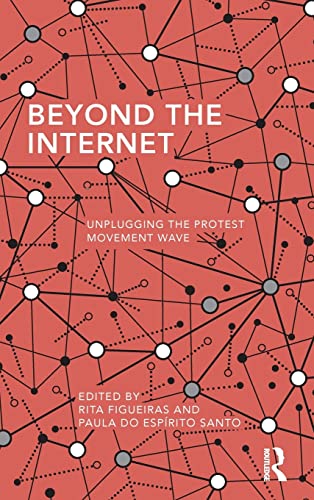Items related to Beyond the Internet: Unplugging the Protest Movement...
Beyond the Internet: Unplugging the Protest Movement Wave (Routledge Studies in Global Information, Politics and Society) - Hardcover

Synopsis
The western economic and financial crisis began with the collapse of Lehman Brothers in 2008 and led the European Union countries into recession. After this, governments started to implement austerity measures, such as cuts in public spending, including public subsidies and jobs, and rising prices. In this context, Europe started to experience a wave of protest movements. Individuals started to use the manifold interactive digital media environment to both fight against the austerity measures and find alternative ways of claiming their democratic rights. Inspired by the 2011 Arab Spring and the Occupy Wall Street movement in New York (USA), the Occupy LSX encampment in Central London (UK), The Outraged (Los Indignados)/ 15M encampment in Central Madrid (Spain), the Syntagma Square’s Outraged movement in Athens (Greece) and the March 12th Movement in Lisbon (Portugal), although short-lived, epitomize an emerging alternative politics and participation via the media. This wave has promoted a debate on how the realm of politics is changing, as citizens broaden their ideas of what political issues and participation mean.
Beyond the Internet examines the technological dimension of the recent wave of protest movements in the United Kingdom, Spain, Portugal, Greece, and Ireland. Offering an opportunity to achieve a better understanding of the dynamics between society, politics and technology, this volume questions the essentialist attributes of the Internet that fuel the techno-centric discourse. The contributors illustrate how all these protest movements were active in the social media and garnered high levels of media attention and public visibility, in spite of their failure to achieve their political goals. As intra-elite dissent was pivotal in understanding the Arab uprisings, the coalition of national ruling elites with European institutions in terms of austerity strategy is essential in understanding the limits of media/technology power and, therefore, the dissociation between communication and representative power.
"synopsis" may belong to another edition of this title.
About the Author
Rita Figueiras is a professor at the Faculty of Human Sciences at the Universidade Catolica Portuguesa and member of the board of directors of the Research Centre for Communication and Culture (CECC). Her work focuses on media and political communication, particularly in the areas of public opinion, pundits, electoral campaigns, and, more broadly, the relationship between the media and democracy.
Paula do Espírito Santo is a professor at the School of Social and Political Sciences (ISCSP)―University of Lisbon (ULisboa) and School of Police Sciences and Internal Security (ISCPSI), Portugal, and is a visiting scholar at other universities. Her research focus is on political communication and political sociology, including the study of political culture, party supporters and social sciences methodology.
"About this title" may belong to another edition of this title.
FREE shipping within United Kingdom
Destination, rates & speedsSearch results for Beyond the Internet: Unplugging the Protest Movement...
Beyond the Internet: Unplugging the Protest Movement Wave (Routledge Studies in Global Information, Politics and Society)
Seller: Chiron Media, Wallingford, United Kingdom
Hardcover. Condition: New. Seller Inventory # 6666-TNFPD-9781138915640
Quantity: 5 available
Beyond the Internet: Unplugging the Protest Movement Wave
Print on DemandSeller: THE SAINT BOOKSTORE, Southport, United Kingdom
Hardback. Condition: New. This item is printed on demand. New copy - Usually dispatched within 5-9 working days. Seller Inventory # C9781138915640
Quantity: 5 available
Beyond the Internet : Unplugging the Protest Movement Wave
Seller: GreatBookPricesUK, Woodford Green, United Kingdom
Condition: New. Seller Inventory # 23890715-n
Quantity: Over 20 available
Beyond the Internet: Unplugging the Protest Movement Wave (Routledge Studies in Global Information, Politics and Society)
Seller: Books Puddle, New York, NY, U.S.A.
Condition: New. pp. 224. Seller Inventory # 26372397519
Quantity: 4 available
Beyond the Internet: Unplugging the Protest Movement Wave (Routledge Studies in Global Information, Politics and Society)
Print on DemandSeller: Majestic Books, Hounslow, United Kingdom
Condition: New. Print on Demand pp. 224. Seller Inventory # 373680656
Quantity: 4 available
Beyond the Internet
Print on DemandSeller: moluna, Greven, Germany
Condition: New. Dieser Artikel ist ein Print on Demand Artikel und wird nach Ihrer Bestellung fuer Sie gedruckt. Rita Figueiras is a professor at the Faculty of Human Sciences at the Universidade Catolica Portuguesa and member of the board of directors of the Research Centre for Communication and Culture (CECC). Her work focuses on media and political communication. Seller Inventory # 595440121
Quantity: Over 20 available
Beyond the Internet: Unplugging the Protest Movement Wave (Routledge Studies in Global Information, Politics and Society)
Seller: Ria Christie Collections, Uxbridge, United Kingdom
Condition: New. In. Seller Inventory # ria9781138915640_new
Quantity: Over 20 available
Beyond the Internet : Unplugging the Protest Movement Wave
Seller: GreatBookPrices, Columbia, MD, U.S.A.
Condition: New. Seller Inventory # 23890715-n
Quantity: Over 20 available
Beyond the Internet: Unplugging the Protest Movement Wave (Routledge Studies in Global Information, Politics and Society)
Print on DemandSeller: Biblios, Frankfurt am main, HESSE, Germany
Condition: New. PRINT ON DEMAND pp. 224. Seller Inventory # 18372397509
Quantity: 4 available
Beyond the Internet
Print on DemandSeller: PBShop.store UK, Fairford, GLOS, United Kingdom
HRD. Condition: New. New Book. Delivered from our UK warehouse in 4 to 14 business days. THIS BOOK IS PRINTED ON DEMAND. Established seller since 2000. Seller Inventory # L1-9781138915640
Quantity: Over 20 available

